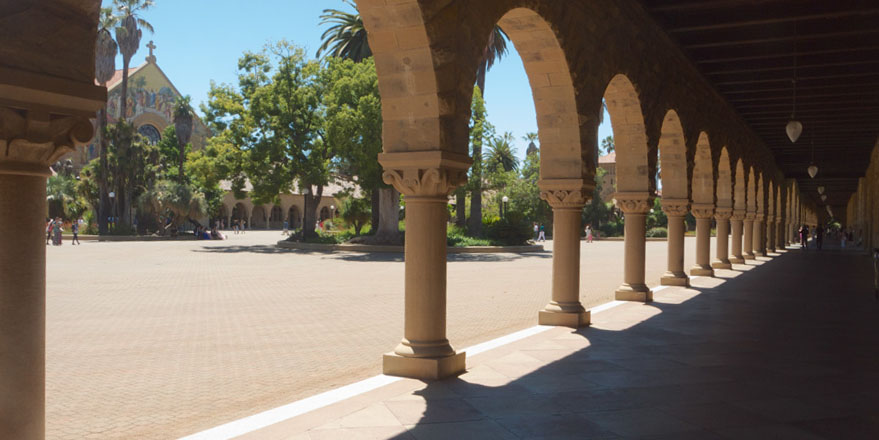At a Monday town hall, Stanford President Marc Tessier-Lavigne and newly appointed Provost Persis Drell outlined a community-wide initiative to articulate Stanford’s vision for the future.

Taking questions from an audience of mostly faculty and staff, the university leaders also sought to address concerns about sexual assault, shifting immigration policies, high costs of living and more.
Drell called Stanford’s long-range planning process, last undertaken about a decade ago, the “most important thing that we [do] over the next year as an institution.” The effort will focus on four major areas: education, research, the Stanford community and the University’s role beyond campus. Each area will have its own steering committee composed of about 20 faculty, staff and students, but Drell and Tessier-Lavigne hope that the entire University community will contribute to Stanford’s blueprint for its next 10 years and beyond.
“We do not want this to be a top down effort,” Tessier-Lavigne said. “We want it to be bottom-up.”
Accordingly, from now until May, the University will simply gather input; community members will soon be able to submit their ideas online. From May until September, steering committees will consider all suggestions, seeking to organize them and identify overlaps rather than winnow them down. Tessier-Lavigne said the administration expects several hundred submissions in each of the planning effort’s four areas.
Finally, in the fall, university leadership will examine the input and assemble a coherent vision, which Tessier-Lavigne suggested will consider not only how Stanford can improve itself but also how it can “advance humanity.” The plan will go before the Board of Trustees for approval in winter or spring.
Before opening up the majority of the hour-long town hall to questions, Drell brought up two issues that she said have been “on her mind” recently.
First, she addressed sexual assault on campus, a longtime issue that sparked new controversy this month after the University dismissed a Title IX lawyer while citing critical comments the attorney made to The New York Times about Stanford’s sexual assault review process. Many community members — including the Undergraduate Senate — have been skeptical of the University’s statements that it did not act in retaliation.
“I believe that no one in the room bought the story that was being told,” said one student who listened to the Senate grill an administrator about the lawyer’s removal.
Drell claimed that after investigating the issue she found no evidence of retaliation, which she said would be “unacceptable in our culture.” However, Drell said the lawyer’s dismissal raised questions for her about a pilot program that provides students involved in Title IX cases with up to nine hours of free legal advice. Drell has asked the University’s committee on sexual assault policies to review the program, which she emphasized is part of a larger pilot process subject to revision.
“You can argue for a long time to try to get it exactly right, or you can start fixing it and correct as you go along,” Drell said in reference to the University’s new Title IX process. “I firmly believe [the latter] is the right way for us to move forward.”
Turning to concerns about how President Donald Trump’s administration would affect immigrants at Stanford, Drell reaffirmed the University’s commitment to challenge policies in court and give affected community members legal, financial and emotional support. Later, though, Drell emphasized that Stanford does not “engage in political dialogue,” in order to maintain freedom of expression on campus.
“[But] we don’t hesitate to take positions when events in the world impinge on our fundamental values,” Tessier-Lavigne clarified.
Tessier-Lavigne and Drell briefly touched on a number of other issues during the Q&A session. On affordable housing and daycare – topics that Tessier-Lavigne said surface in nearly every meeting he has with community members — the President and Provost did not give specifics but promised to prioritize concerns about Bay Area cost-of-living. Drell noted that affordability would be a major topic for long-range planning.
Asked what he and Drell would do to keep Stanford staff from feeling like “second class citizens,” Tessier-Lavigne briefly mentioned affordability again — a concern for some staff who say they are neglected in the push for on-campus housing and reduced commutes. However, he said he would focus primarily on ensuring that staff feel more connected to the University’s research and education activities.
Above all, Tessier-Lavigne and Drell reiterated their willingness to listen.
“One of the things that both Persis and I have heard consistently, especially from students and also from others, is a desire for open communication with all members of the campus,” Tessier-Lavigne said. “The great news is that, for Persis and myself, this is actually very much our natural style.”
Contact Hannah Knowles at hknowles ‘at’ stanford.edu.
